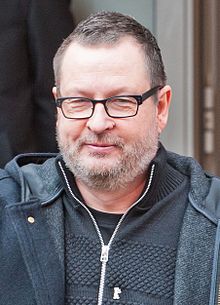
Back لارس فون ترايير Arabic لارس فون ترايير ARZ Lars von Trier AST Lars fon Trier Azerbaijani Ларс фон Трыер Byelorussian Лярс фон Трыер BE-X-OLD Ларс фон Триер Bulgarian লারস ভন ট্রাইয়ার Bengali/Bangla Lars von Trier BS Lars von Trier Catalan
This article's "criticism" or "controversy" section may compromise the article's neutrality. (January 2024) |
Lars von Trier | |
|---|---|
 Trier at the 64th Berlin International Film Festival, 2014 | |
| Born | Lars Trier 30 April 1956 Kongens Lyngby, Denmark |
| Alma mater | |
| Occupation(s) | Film director, screenwriter |
| Years active | 1967–present |
| Notable work | Filmography |
| Movement | Hyperrealism, Dogme 95, German Expressionism |
| Spouses | |
| Awards | Palme d'Or, EFA, Cesar, Bodil, Goya, FIPRESCI |
| Honours | Knight of the Order of the Dannebrog |
Lars von Trier (né Trier; 30 April 1956)[3] is a Danish film director and screenwriter.
Beginning in the late-1960s as a child actor working on Danish television series Secret Summer, von Trier's career has spanned more than five decades.[4][5] Considered a major figure of the European film industry, he and his works have been variously described as ambitious and provocative, as well as technically innovative.[6][7] His films offer confrontational examinations of existential, social,[8][9] psychosexual, and political[4][10] issues, and deal in subjects[10] including mercy,[11] sacrifice, and mental health.[12] He frequently collaborates with the actors Jens Albinus, Jean-Marc Barr, Udo Kier and Stellan Skarsgård.
Von Trier co-created the avant-garde filmmaking movement Dogme 95 alongside fellow director Thomas Vinterberg and co-founded the Danish film production company Zentropa,[13][14] the films from which have sold more than 350 million tickets and garnered eight Academy Award nominations.
Von Trier has been the subject of criticisms and controversies. Cannes Film Festival, in addition to awarding his films on numerous occasions, once listed him as persona non grata for making a Nazism joke during an interview; animal harm on Manderlay's set, and graphic violence and unsimulated sex in some of his films have drawn criticism; and he has been accused of mistreatment and negligence towards actresses during the filming process, including Björk.[15][16][17]
- ^ Lumholdt, Jan (2003). Lars von Trier: interviews. Univ. Press of Mississippi. pp. 22–23. ISBN 978-1-57806-532-5. Archived from the original on 3 June 2013. Retrieved 14 October 2010.
- ^ Dinesen, Lars (4 September 2015). "Lars von Trier skal skilles" (in Danish). metroxpress. Archived from the original on 4 February 2017. Retrieved 4 February 2017.
- ^ Lumholdt, Jan (1 January 2003). Lars Von Trier: Interviews. Univ. Press of Mississippi. ISBN 978-1-57806-532-5. Archived from the original on 27 April 2016. Retrieved 13 December 2015.
- ^ a b "Kinema:A Journal for Film and Audiovisual Media". kinema.uwaterloo.ca. Archived from the original on 27 August 2016. Retrieved 27 July 2016.
- ^ "A joke or the most brilliant film-maker in Europe?". The Guardian. 22 January 1999. Archived from the original on 21 September 2016. Retrieved 27 July 2016.
- ^ Simons, Jan (1 January 2007). Playing the Waves: Lars Von Trier's Game Cinema. Amsterdam University Press. ISBN 9789053569917.
- ^ "Carl Th. Dreyer – From Dreyer to von Trier". Archived from the original on 29 June 2017. Retrieved 27 July 2016.
- ^ Badley, Linda. "UI Press | Linda Badley | Lars von Trier". www.press.uillinois.edu. Archived from the original on 16 August 2016. Retrieved 27 July 2016.
- ^ "Politics and Open-ended Dialectics in Lars von Trier's Dogville: a Post-Brechtian Critique, in New Review of Film and Television Studies 11:3 (2013), pp.334–353". Archived from the original on 13 September 2022. Retrieved 27 July 2016.
- ^ a b "Scandinavian Canadian Studies: Behind Idealism: The Discrepancy between Philosophy and Reality in The Cinema of Lars von Trier". scancan.net. Archived from the original on 18 October 2014. Retrieved 27 July 2016.
- ^ Behrend, Wendy Shanel (2014). The Birth of Tragedy in Lars von Trier's 'Melancholia' (Honors thesis). Portland State University. doi:10.15760/honors.99. Archived from the original on 15 August 2016. Retrieved 25 July 2016.
- ^ Badley, Linda (1 January 2010). Lars Von Trier. University of Illinois Press. ISBN 978-0-252-07790-6. Archived from the original on 2 May 2019. Retrieved 25 July 2016.
- ^ Winfrey, Graham (24 May 2016). "How Lars Von Trier's Zentropa Is Conquering Europe". Archived from the original on 16 August 2016. Retrieved 24 July 2016.
- ^ "HISTORIEN – Historien om Zentropa". zentropa.dk. Archived from the original on 20 November 2016. Retrieved 28 July 2016.
- ^ Dowell, Pat. "Lars Von Trier: A Problematic Sort Of Ladies' Man?". NPR.
- ^ Falbo, Benjamin (8 July 2021). "The Most Controversial Directors Of All Time". Looper. Retrieved 6 December 2022.
- ^ "The Lars von Trier film he believes wasn't "hated enough"". faroutmagazine.co.uk. 2 June 2022. Retrieved 6 December 2022.
© MMXXIII Rich X Search. We shall prevail. All rights reserved. Rich X Search